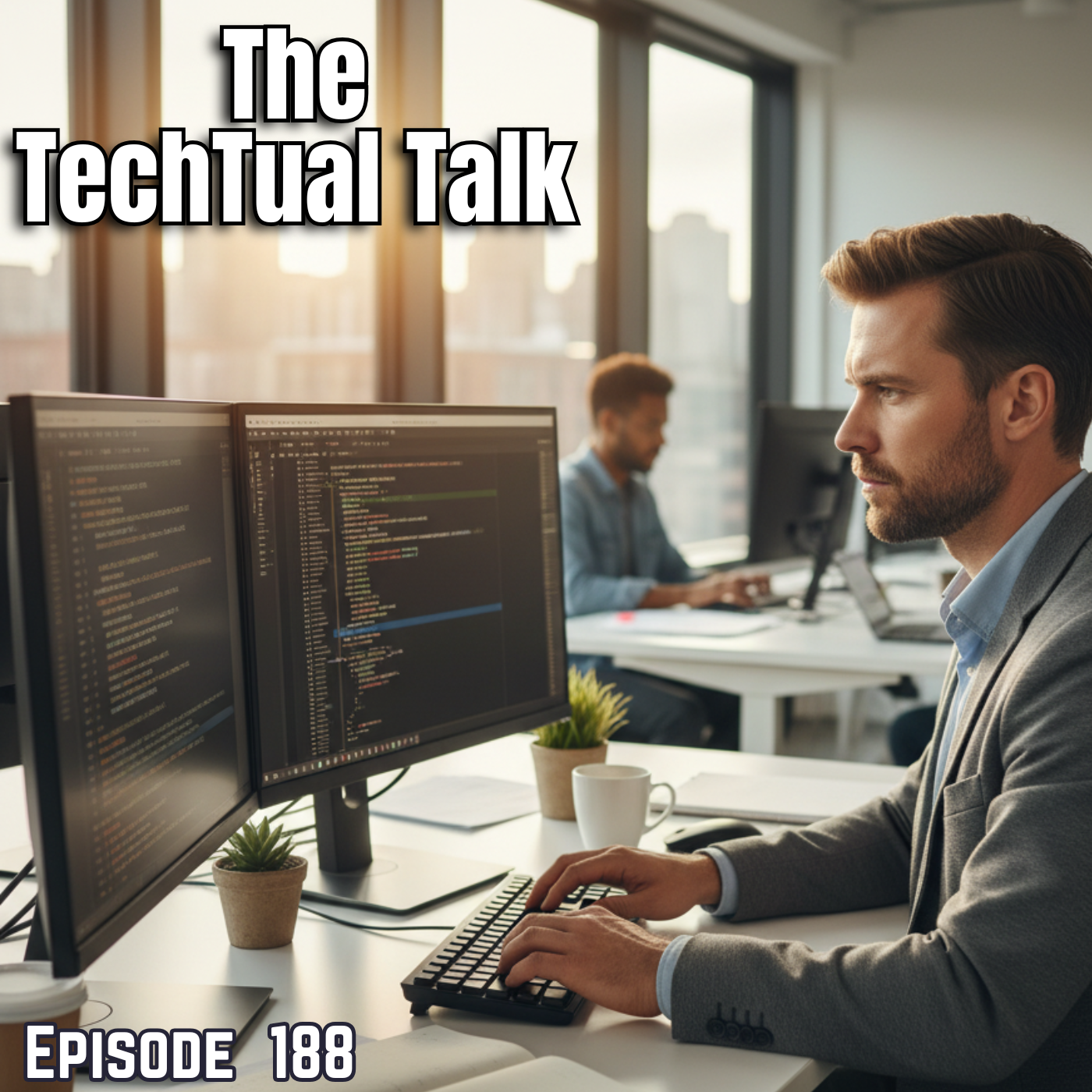Is GRC Analyst Obsolete? The Rise of GRC Engineering

In today's rapidly evolving technological landscape, the roles within Governance, Risk, and Compliance (GRC) are undergoing a significant transformation. This blog post delves into the shifting dynamics of GRC, exploring the myth that it's a non-technical field and highlighting the emergence of GRC Engineering. We'll discuss the essential technical skills required for modern GRC professionals, the impact of AI tools, the importance of practical experience, and how to navigate the job market with a focus on technical GRC expertise. Consider this a deep dive into the modernization of the GRC space, and if you found yourself enjoying this content, make sure to check out Ep. 188 Are GRC Analyst roles dead, is GRC engineering the future, tech startups!
Introduction: The Evolving World of GRC
The field of GRC has traditionally been viewed as a compliance-heavy domain, often associated with policy documentation, audits, and regulatory adherence. However, the increasing complexity of IT systems, cloud infrastructure, and cybersecurity threats has necessitated a shift towards a more technical and engineering-focused approach. The modern GRC professional needs to understand not only the regulatory requirements but also the technical controls and infrastructure required to meet those requirements.
This evolution has led to the rise of GRC Engineering, a discipline that blends the traditional GRC principles with technical expertise in areas like cloud computing, cybersecurity, and software development. As organizations increasingly rely on technology to achieve their business objectives, the role of GRC in ensuring secure and compliant operations becomes more critical than ever.
Debunking the Myth: GRC is NOT Non-Technical
A common misconception about GRC is that it's a non-technical field primarily focused on paperwork and policy creation. While documentation and policy are still important, the reality is that modern GRC requires a deep understanding of the technologies and systems being governed. Without technical knowledge, GRC professionals cannot effectively assess risks, implement controls, or monitor compliance.
For example, consider a GRC analyst responsible for ensuring compliance with GDPR (General Data Protection Regulation) in a cloud environment. They need to understand how data is stored, processed, and transferred in the cloud. They need to know how to configure security controls like encryption, access control lists (ACLs), and data loss prevention (DLP) policies. Without this technical understanding, they cannot effectively assess the organization's GDPR compliance posture.
Furthermore, the increasing adoption of automation and AI in GRC requires professionals who can understand and leverage these technologies. This includes skills in scripting, data analysis, and machine learning. Therefore, it's crucial to dispel the myth that GRC is a non-technical field and recognize the growing importance of technical skills in this domain.
The Shift Towards GRC Engineering
GRC Engineering represents a fundamental shift in the way organizations approach GRC. Instead of relying solely on manual processes and documentation, GRC Engineering focuses on building automated systems and processes that ensure continuous compliance and risk management. This involves integrating GRC principles into the software development lifecycle, infrastructure deployment, and operational processes.
GRC Engineers are responsible for designing, implementing, and maintaining these systems. They work closely with developers, security engineers, and operations teams to ensure that security and compliance are built into the organization's infrastructure and applications from the ground up. This proactive approach to GRC helps organizations avoid costly compliance violations and security breaches.
The rise of GRC Engineering is driven by several factors, including the increasing complexity of IT environments, the need for continuous monitoring and compliance, and the growing adoption of cloud computing. As organizations move more of their operations to the cloud, they need GRC professionals who can understand and manage the unique security and compliance challenges of cloud environments.
Essential Technical Skills: Cloud and Python
To succeed in the modern GRC landscape, professionals need a strong foundation in key technical skills. Two of the most important skills are cloud computing and Python programming.
Cloud Computing
Cloud computing has become ubiquitous, and organizations of all sizes are using cloud services to host their applications, store their data, and run their operations. This means that GRC professionals need to understand the security and compliance implications of cloud computing.
Specifically, GRC professionals should have a strong understanding of cloud platforms like AWS (Amazon Web Services), Azure, and Google Cloud Platform (GCP). They should be familiar with cloud security best practices, such as identity and access management (IAM), network security, and data encryption. They should also understand how to use cloud-native security tools and services to monitor and manage compliance.
For example, a GRC engineer working with AWS might use AWS Config to monitor the configuration of AWS resources and ensure that they comply with organizational policies. They might use AWS CloudTrail to log all API calls made to AWS services and detect suspicious activity. They might use AWS Security Hub to aggregate security findings from various AWS services and identify potential security risks.
Python Programming
Python is a versatile programming language that is widely used in GRC for automation, data analysis, and security tasks. GRC professionals can use Python to automate repetitive tasks like compliance checks, vulnerability scans, and incident response. They can also use Python to analyze security data, identify trends, and generate reports.
For example, a GRC analyst might use Python to automate the process of checking whether all servers in a network are patched with the latest security updates. They might use Python to analyze firewall logs and identify potential security threats. They might use Python to generate reports on the organization's security posture and compliance status.
Learning Python can greatly enhance a GRC professional's ability to automate tasks, analyze data, and improve security. There are many online resources available to learn Python, including tutorials, courses, and books. Even a basic understanding of Python can be a valuable asset in the modern GRC landscape.
AI Tools and the Future of GRC
Artificial intelligence (AI) is rapidly transforming the GRC landscape. AI-powered tools are being used to automate compliance tasks, detect security threats, and improve risk management. GRC professionals need to understand how these tools work and how to leverage them effectively.
For example, AI can be used to automate the process of identifying and classifying sensitive data. This is particularly useful for organizations that need to comply with data privacy regulations like GDPR and CCPA (California Consumer Privacy Act). AI can also be used to monitor network traffic and identify suspicious activity that might indicate a security breach.
However, it's important to note that AI is not a silver bullet. AI tools are only as good as the data they are trained on, and they can be biased or inaccurate if the data is flawed. GRC professionals need to carefully evaluate AI tools and ensure that they are used responsibly and ethically.
In the future, AI is likely to play an even bigger role in GRC. As AI technology improves, it will be able to automate more complex tasks and provide more insights into an organization's risk and compliance posture. GRC professionals who embrace AI and learn how to use it effectively will be well-positioned for success in the future.
The Importance of Portfolios and Practical Experience
In addition to technical skills, practical experience is crucial for GRC professionals. Employers are increasingly looking for candidates who can demonstrate their skills and experience through portfolios and real-world projects.
A GRC portfolio might include examples of policy documents, security assessments, compliance reports, and automation scripts. It could also include contributions to open-source GRC projects or presentations on GRC topics. The goal is to showcase your skills and experience to potential employers.
Practical experience can be gained through internships, volunteer work, or personal projects. For example, you could volunteer to help a non-profit organization improve its security posture. You could create a personal project to automate a compliance task using Python. The key is to get hands-on experience and demonstrate your ability to apply your skills in real-world scenarios.
Building a strong portfolio and gaining practical experience can significantly increase your chances of landing a GRC job. It shows employers that you are not just knowledgeable about GRC concepts but also capable of applying them in practice.
Navigating the Job Market: Showcasing Technical GRC Skills
The job market for GRC professionals is competitive, and it's important to know how to showcase your technical skills to potential employers. This starts with your resume and cover letter.
Your resume should highlight your technical skills, such as cloud computing, Python programming, and security tools. It should also include examples of projects you have worked on that demonstrate your technical abilities. Use keywords that are relevant to the job you are applying for.
Your cover letter should explain why you are interested in the job and how your skills and experience make you a good fit for the role. Be specific about your technical skills and how you have used them to solve problems in the past.
During the interview process, be prepared to answer technical questions about cloud computing, security, and compliance. Be able to explain how you would approach common GRC challenges and how you would use your technical skills to solve them.
It's also a good idea to research the company and the specific GRC challenges they face. This will allow you to tailor your answers to their needs and demonstrate your understanding of their business.
GRC's Crucial Role in Cybersecurity
GRC plays a vital role in cybersecurity. By establishing clear policies, procedures, and controls, GRC helps organizations protect their assets from cyber threats. GRC also ensures that organizations comply with relevant laws and regulations, such as GDPR and HIPAA (Health Insurance Portability and Accountability Act).
Cybersecurity is not just a technical issue; it's also a governance and compliance issue. Organizations need to have a strong GRC framework in place to effectively manage their cybersecurity risks. This framework should include policies for incident response, data breach notification, and security awareness training.
GRC professionals work closely with cybersecurity teams to ensure that security controls are implemented effectively and that the organization is prepared to respond to cyber incidents. They also help to ensure that the organization complies with relevant cybersecurity regulations and standards.
As cyber threats become more sophisticated and frequent, the role of GRC in cybersecurity will become even more critical. Organizations need GRC professionals who can understand the technical aspects of cybersecurity and who can develop and implement effective security policies and controls.
GRC Engineering: A Continuous Evolution
GRC Engineering is not a static field; it's constantly evolving as technology changes and new threats emerge. GRC professionals need to be lifelong learners, constantly updating their skills and knowledge to keep up with the latest trends.
This includes staying up-to-date on new cloud technologies, security tools, and compliance regulations. It also includes learning new programming languages and automation techniques. GRC professionals should also be active in the GRC community, attending conferences, participating in online forums, and networking with other professionals.
The continuous evolution of GRC Engineering requires a commitment to lifelong learning and a willingness to embrace new technologies and approaches. GRC professionals who are willing to invest in their skills and knowledge will be well-positioned for success in the future.
Conclusion: Embracing the Future of GRC
The GRC landscape is undergoing a significant transformation, with a growing emphasis on technical skills and engineering principles. The myth that GRC is a non-technical field is being dispelled, and organizations are increasingly recognizing the importance of GRC Engineering. As we've explored, roles in the space are being augmented by the need to have a technical understanding of concepts like cloud computing, coding, and AI usage. This transformation presents both challenges and opportunities for GRC professionals.
By embracing the shift towards GRC Engineering, developing essential technical skills, and showcasing their expertise through portfolios and practical experience, GRC professionals can thrive in the modern job market. As we've discussed today, there is a need to understand how these various technologies can be leveraged. You can explore the topics we covered in even more detail by listening to Ep. 188 Are GRC Analyst roles dead, is GRC engineering the future, tech startups!. Remember, the future of GRC is here, and it's technical.










